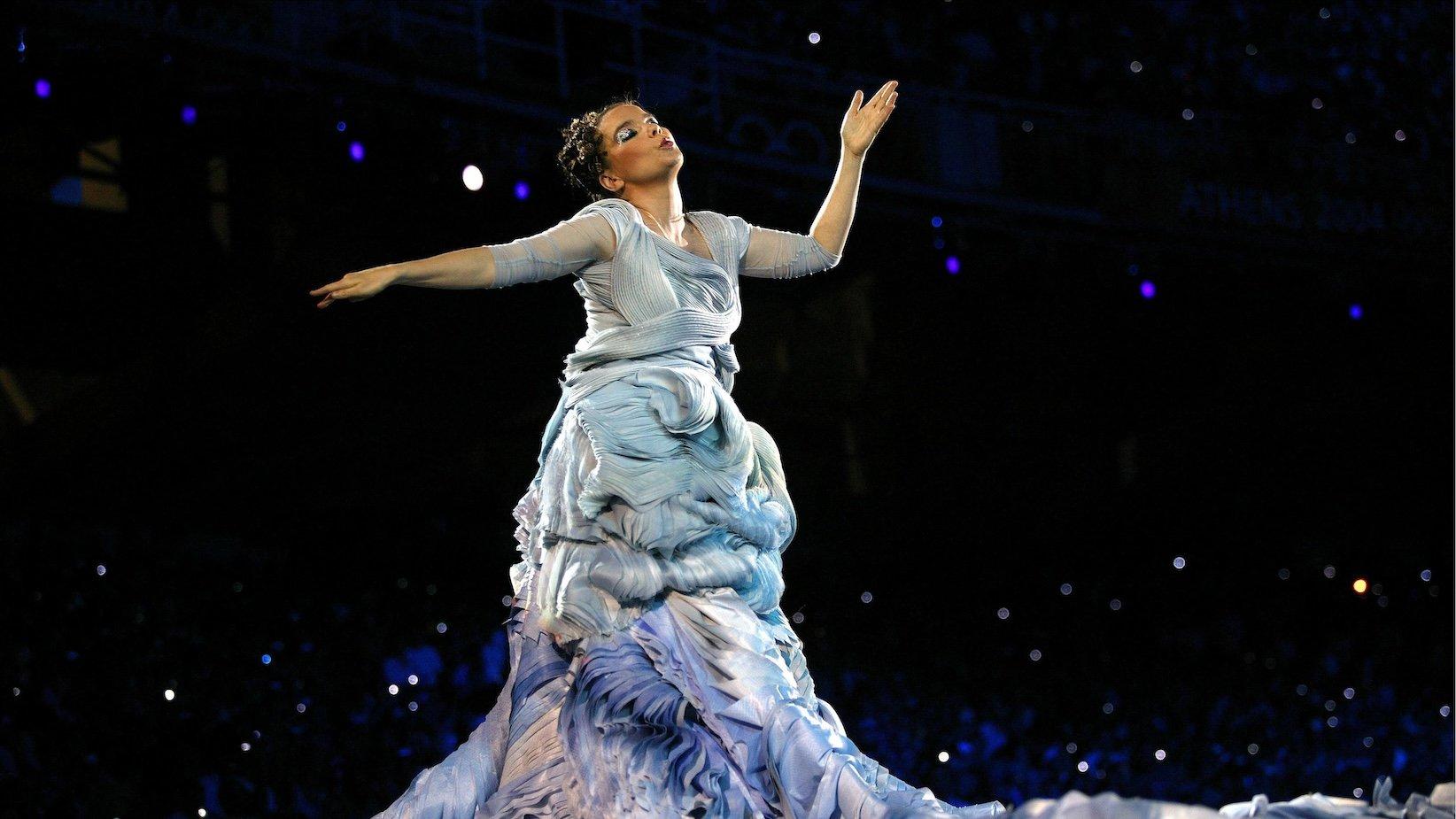Mariah, Whitney and Celine—a.k.a. the holy trinity of pop divas with pyrotechnic vocal ranges—had enjoyed triumphant years before. Carey scored the biggest-selling album of 1991 with her self-titled debut, which spawned four consecutive No. 1s. Houston achieved the same feat in 1986 and 1993 with her eponymous first LP and The Bodyguard OST. And the chart-topping success of Celine Dion's "The Power of Love" in 1994 helped push its parent album The Colour of My Love to sales of more than 20 million.
In 1996, the stars aligned for all three powerhouse singers to reach the pole position on Billboard’s singles chart. The trio essentially monopolized its first six months. You had to wait until May 18—when the distinctly non-pop-diva-like Bone Thugs-n-Harmony’s hip-hop eulogy "Tha Crossroads" replaced Carey’s "Always Be My Baby"—to hear someone else at the top of the US Hot 100.
This remarkable pop diva merry-go-round had actually started back in September 1995 thanks to "Fantasy." Sampling Tom Tom Club and featuring Ol' Dirty Bastard, the sublime Daydream cut pioneered the soon-to-be ubiquitous hip-hop sound. At eight weeks, it also became the longest-running of Carey’s first nine No. 1s before being unseated by her biggest rival’s "Exhale (Shoop Shoop)."
<style>.embed-container { position: relative; padding-bottom: 56.25%; height: 0; overflow: hidden; max-width: 100%; } .embed-container iframe, .embed-container object, .embed-container embed { position: absolute; top: 0; left: 0; width: 100%; height: 100%; }</style><div class='embed-container'><iframe src='https://www.youtube.com/embed/UXxRyNvTPr8' frameborder='0' allowfullscreen></iframe></div>
That, in turn, was knocked off the top spot after just seven days by another Carey collaboration, with the slick vocal harmonies of Boyz II Men replacing the gonzo, growling rhymes of ODB. A tribute to the loved ones who they’d lost to the AIDS epidemic, "One Sweet Day" remarkably remained the nation’s most popular single until March of the following year. The song’s record-breaking 16-week stint wouldn’t be surpassed until another much less likely duet 23 years later, Lil Nas X’s and Billy Ray Cyrus’ hick-hop smash "Old Town Road."
The artist who finally toppled "One Sweet Day" ended up truly dominating 1996. Although Dion had already released a string of albums before Houston and Carey had set foot inside a recording studio, the Canadian only began making waves outside the Francophone market with 1990’s Unison. It would be another four years before she started being mentioned in the same breath. But by the end of her fourth English-language album’s campaign, Dion had become the new queen.
A true blockbuster of a record, Falling Into You reportedly shifted a colossal 32 million copies, placing it in the same bracket as The Beatles’ Sgt. Pepper’s Lonely Hearts Club Band and Eagles’ Hotel California. It spawned two No.1 hits: the slow-building theme to the Robert Redford/Michelle Pfeiffer romance Up Close and Personal, "Because You Loved Me," and the epic-from-the-get-go "It’s All Coming Back to Me Now." And it saw Dion recognized at every major award ceremony, including the Oscars, Golden Globes, and, most notably, the GRAMMYs.
<style>.embed-container { position: relative; padding-bottom: 56.25%; height: 0; overflow: hidden; max-width: 100%; } .embed-container iframe, .embed-container object, .embed-container embed { position: absolute; top: 0; left: 0; width: 100%; height: 100%; }</style><div class='embed-container'><iframe src='https://www.youtube.com/embed/O3XGynvy_V4' frameborder='0' allowfullscreen></iframe></div>
Of course, Houston had previously shared the Album of the Year award for her contributions to The Bodyguard OST. However, Dion was the first of her peers to achieve the accolade entirely independently: despite some rather snooty predictions, Carey’s Daydream had failed to win the category, or indeed any of the five others it was nominated for, in 1996. Falling Into You, which was additionally crowned Best Pop Album at the same 1997 ceremony, even beat another Houston-heavy soundtrack, Waiting to Exhale, to the glittering prize.
Proving her double-threat credentials once again, Houston not only held her own against Angela Bassett in Forest Whitaker’s directorial debut, but she lent her unmistakable voice to three of its songs as well. "Why Does It Hurt So Bad" and CeCe Winans’ duet "Count on Me" later joined "Exhale" on Houston’s tally of Top 30 entries, as did "I Believe in You and Me" from The Preacher’s Wife OST later that same year, too.
Houston wasn’t the only pop diva to score hits from the 12 million-selling Waiting to Exhale, which placed fourth behind Falling Into You, Daydream and Alanis Morissette’s Jagged Little Pill on 1996’s year-end album chart. Mary J. Blige’s defiant slow jam, "Not Gon’ Cry," became the Queen of Hip-Hop Soul’s biggest single to date before the sweetly-sung funk of Brandy’s "Sittin’ Up In My Room" followed in its footsteps by also peaking at No.2. Meanwhile, Toni Braxton’s emotive ballad, "Let It Flow," effectively topped the charts thanks to its memorable double A-side.
<style>.embed-container { position: relative; padding-bottom: 56.25%; height: 0; overflow: hidden; max-width: 100%; } .embed-container iframe, .embed-container object, .embed-container embed { position: absolute; top: 0; left: 0; width: 100%; height: 100%; }</style><div class='embed-container'><iframe src='https://www.youtube.com/embed/wIgOL21S98o' frameborder='0' allowfullscreen></iframe></div>
Braxton had a remarkable 1996 herself, following up the No. 1 success of "You’re Makin' Me High" with the year’s defining power ballad, "Un-Break My Heart" (its parent LP Secrets went eight times platinum, too). Although she wasn’t entirely averse to bombast, Babyface’s musical protégé proved you didn’t have to shatter glasses to be considered a ‘90s pop diva. Alongside Brandy, Monica and another Waiting to Exhale contributor, TLC’s T-Boz, Braxton’s strengths lay in the kind of rich lower register that could melt butter.
On the other end of the spectrum, the featherlight vocals of Aaliyah had found their perfect foil in the shape of Timbaland and Missy Elliott’s futuristic production on One In a Million. The sparse robotic funk of "If Your Girl Only Knew" was a prime contender for single of the year. Then there was Lauryn Hill, busy sowing the seeds for her frustratingly erratic solo career as the gritty but beautifully melodic voice behind 1996’s biggest hip-hop act, Fugees.
And although the States would have to wait until the following year for Spicemania to take hold, there were still plenty of groups bringing the girl power. SWV scored their final Top 10 hit with "You’re the One," 702 put themselves on the map with the slick street soul of "Steelo" and Total provided the sugary melodic hook for LL Cool J’s bedroom song "Loungin’." The self-ordained funkiest bunch of divas, En Vogue, also launched their comeback single, "Don’t Let Go," which in 1997 saw them come agonizingly close to the top spot for the third time.
The new guard of pop divas, however, hadn’t completely shut out the old. Barbra Streisand reached the Top 10 for the first time since 1981 with "I Finally Found Someone," the Oscar-nominated Bryan Adams collaboration taken from her self-directed starring vehicle, The Mirror Has Two Faces. Gloria Estefan’s soaring "Reach" was chosen as the official anthem for the year’s biggest sporting event, the Atlanta Olympics. And Cher ("One By One"), Tina Turner ("Missing You") and Chaka Khan & Gladys Knight ("Missing You") all made deserved returns to the US Hot 100.
<style>.embed-container { position: relative; padding-bottom: 56.25%; height: 0; overflow: hidden; max-width: 100%; } .embed-container iframe, .embed-container object, .embed-container embed { position: absolute; top: 0; left: 0; width: 100%; height: 100%; }</style><div class='embed-container'><iframe src='https://www.youtube.com/embed/lTLq2bIrndU' frameborder='0' allowfullscreen></iframe></div>
Perhaps the most interesting pop diva development, though, arrived at the tail end of the year. Madonna had already settled into the demure balladeer phase of her career with the hits compilation Something to Remember. But she made an even more concerted bid for respectability with the leading role in Evita. The First Lady of Pop’s performance as the First Lady of Argentina was deemed the strongest in her filmography. Simultaneously, the accompanying soundtrack—recorded with musical impresarios Andrew Lloyd Webber and Tim Rice—silenced those who believed she didn’t possess the range.
Of course, Madge would soon reinvent herself as the Earth Mother of electronica on 1998’s magnum opus Ray of Light, completely abandoning the showboating love songs that had become Carey, Houston and Dion’s forte. Yet whereas the latter went on to double down on the histrionics with Streisand duets and disaster movie themes, her two vocal counterparts also began to explore much more credible directions.
Carey roped in Q-Tip, Missy and P. Diddy for the urban pop of 1997’s Butterfly, a clear statement of independence following her split with manager husband Tommy Mottola. Houston, meanwhile, surprised everyone with 1999’s My Love Is Your Love, a masterful comeback guided by a who’s who of contemporary R&B including Rodney Jerkins, Wyclef Jean and Soulshock & Karlin.
By this point, VH1 had belatedly recognized that we were in a golden era for female vocalists, launching their own charity concert series simply titled Divas. The annual show celebrated artists both established and emerging during its initial seven-year run, with Houston, Carey and Dion all making regular appearances.
However, thanks to their dominance of the Billboard charts and the emergence of countless names they inspired, 1996 remains the year when the pop divas—or perhaps more aptly, the elusive chanteuses—truly reigned supreme.
For The Record: Inside The Historic Legacy Of Carole King’s 'Tapestry' At 50









.jpg)

.webp)



